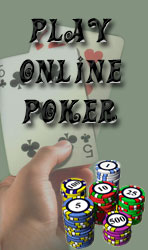Pokerwiner.com → Lessons of poker
PSYCHOLOGY AND FUTURE IMPRESSIONS
Varying your play and making an “incorrect” play intentionally are also part of the psychology of poker because you are trying to affect the thinking of your opponents for future hands.
To take a simple example, you might three-of-a-kind on fourth street in seven card stud with two of the cards showing and check your open pair on a slowplay.
Assuming your opponents saw your hand in a showdown, if you make a similar three-of-a-kind later in the session, you might bet it then.
Since you checked three-of-a-kind before, your opponents are now likely to think you do not have three-of-a-kind, but something like two small pair or one pair and a three-flush.
In other words, you are taking advantage of the impression you created earlier to get paid off later when you bet. By the same token, let’s say you make an open pair on fourth street, but this time that’s all you have.
You check. Now your opponents will be suspicious that you may have three-of-a-kind. They may give you
a free card, and if one of them bets, you can be fairly certain that player has a good hand.
In general, you should evaluate any play you make on its merits alone – that is, on its expectation in a given situation.
However, as we suggested in the chapter on bluffing, you might occasionally want to do something that is theoretically incorrect, especially in a no-limit game.
You might either bluff a hand when you are almost sure you won’t get away with it or fold a legitimate hand when you think you are getting bluffed and then show the hand.
What you are think are trying to do is create in impression for the future.
You are making a bad play so that it sticks in everybody’s mind. Once you have opponents thinking one way, you take advantage of that thinking later.
These types of plays will work against players who are good enough to try to take advantage of their new-found knowledge but who are not good enough to realize that you know they are going to try to take advantage of it and that they should therefore ignore it.
Once again it comes down to knowing your opponents. You have to know how they think and whether they are capable of thinking on the level you are giving them credit for.
If they think on a still higher level, you have to step up to that level too.
Summary
The psychology of poker is an important aspect of the game. You should think not only about what your opponent have, but about what they think you have and about what they think you think they have.
You must go through such thought processes against good players in particular, but the better they are, the more difficult it is to figure them out.
When you get to the expert level, the process sometimes becomes so complex and tenuous that you have to fall back on game theory.
On the other hand, these thought processes can be costly against weak players as we saw in Chapter Eight because your opponents are not thinking on such an advanced level.
Against weak players the best strategy is to play your cards in a basic, Straightforward way.
Thinking about what your opponent is thinking will improve your calling and betting strategy. If an opponent is sure you will call his bet, he is not buffing; if he thinks you will fold, he may be bluffing.
By the same token, if an opponent thinks you are strong, you may be able to bluff, but you should not bet a fair hand for value. If an opponent thinks you are weak, you can’t bluff, but you can bet your fair hands for value.
Ordinarily you evaluate a poker play solely on its own merits, but you can occasionally make a bad play for psychological effect – to create an impression for the future.
The psychology of poker is an extension of reading hands and using deception in the play of your own hands, and thus it is an extension of the Fundamental Theorem of Poker.



